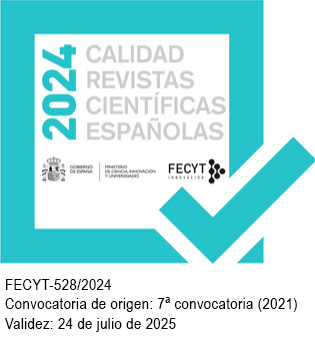La interrupción con valor humorístico como mecanismo de gestión del poder en el discurso parlamentario
Resumen
Este trabajo presenta el análisis de las funciones de la interrupción con valor humorístico desde el punto de vista de la cortesía y la gestión de los papeles conversacionales de los participantes en un debate parlamentario. El estudio se ha efectuado sobre un corpus de elaboración propia construido a partir de la transcripción de las sesiones plenarias de la Asamblea de Madrid entre los años 2010 y 2011. Los datos analizados han arrojado la conclusión de que los políticos, en ocasiones, enmarcan sus interrupciones dentro de un entorno humorístico con el propósito de no infringir las normas básicas que regulan el debate parlamentario.
Palabras clave: humor; cortesía; actividad de imagen; discurso parlamentario; análisis del discurso.
Abstract
This work presents the analysis of the functions of humorous interruptions from the point of view of the politeness and the management of the conversational roles of the participants in the parliamentary debate. The study is made from a corpus prepared by the author, which is constructed from the transcription of the plenary sessions of the Assembly of Madrid between the years 2010 and 2011. The data analyzed lead to the conclusion that politicians sometimes frame their interruptions in a humorous environment in order to not violate the basic norms that regulate the parliamentary debate.
Keywords: humour; politiness; facework; parliamentary discourse; discourse analysis
Descargas
Citas
Arfeen, B. (2009): «Humor in the workplace: How it’s work and what if doesn’t?», LCOM Papers 1, pp. 1-15.
Archakis, A. y Tsakona, V. (2011): «Informal talk in formal settings: Humorous narratives in Greek parliamentary debates», en Tsakona, V. y Popa, D. (eds.), Studies in political humor: In between political critique and public entertainment, Ámsterdam/ Philadelphia, John
Benjamins, pp 61-81.
Atkinson, M. (1988): Our masters’ voices, Londres/Nueva York, Routledge.
Attardo, S. (1994): Linguistic theories of humor, Berlín, Mouton de Gruyter.
Bañón Hernández, A. M. (1997): «La interrupción conversacional. Propuestas para su análisis pragmalingüístico», Analecta Malacitana. Anejo XII.
Beaumont, S. y Cheyne, J. (1998): «Interruptions in adolescent girl’s conversations: Comparing mothers and friends», Journal of Adolescent Research 13, pp. 272-292.
Bengoechea, M. (1993): «La interrupción entre jefas y subordinados/as», en FernándezBarrientos Martín, J. (ed), Actas de las I Jornadas internacionales de lingüística aplicada, Granada, Universidad de Granada-ICE, pp. 15-20.
Bennett, A (1981): «Interruptions and the interpretation of conversation», Discourse Processes 4, pp. 171-188.
Bergson, H. (1973): La risa, Madrid, Espasa Calpe.
Blas Arroyo, J. L. (1998): «Pero no me interrumpa usted, haga el favor... Las interrupciones en el debate político-electoral», Mediterranean Language Review 10, pp. 54-88.
Bourdieu, P. (1992): Language and symbolic power, Cambridge, Polity Press.
Bright, J. 2012: «The dynamics of parliamentary discourse in the UK: 1936-2011», Comunicación para las conferencias IPP, Oxford Internet Institute-Oxford University.
rown, P. y Levinson, S. (1978/1987): Politeness. Some universals in language usage, Cambridge, Cambridge University Press.
Carbó, T. (1992): «Towards an interpretation of interruptions in Mexican parliamentary discourse: 1920-60», Discourse & Society 3, 1, pp. 25-45.
Carrasco Santana, A. (1999): «Revisión y evaluación del modelo de cortesía de Brown y Levinson», Pragmalíngüística 7, pp. 1-44.
Chafe, W. (2007): The importance of not being earnest, Ámsterdam/Philadelphia, John Benjamins.
Charaudeau, P. (2013): «De l’ironie à l’absurde et des catégories aux effets», en Vivero García, D. (ed.), Frontières de l’humour, París, L’Harmattan, pp 13-26.
Chilton, P. (2004): Analysing political discourse: Theory and practice, Londres, Routledge.
Culpeper, J. (1996): «Towards an anatomy of impoliteness», Journal of Pragmatics 25, pp. 349-367.
Curcó, C. (1996): «Relevance theory and humorous interpretations», en Husltijn, J. y Hijholt, A. (eds.), Automatic interpretation and generation of verbal humor, Enschede, Universidad de Twente, pp. 87-101.
Dmitriev, A. (2005-06): «Humor and politics», Anthropology and Archeology of Eurasia 44, 3, pp. 64-100.
Emerson, J. (1969): «Negotiating the serious import of humor», Sociometry 32, 2, pp. 169-181.
Escandell Vidal, M. V. (1995): «Cortesía, fórmulas convencionales y estrategias indirectas», Revista Española de Lingüística 25, 1, pp. 31-66.
—, (2004): «Norms and principles. Putting social and cognitive pragmatics together», en Márquez Reiter, R. y Placencia, M. E. (eds.), Current trends in the pragmatics of Spanish, Ámsterdam/Philadelphia, John Benjamins, pp. 347-371.
Escarpit, R. (1972): El humor, Eudeba, Buenos Aires, Cuadernos Biblioteca Cultural. Forabosco, G. (1992): «Cognitive aspects of the humor process: The concept of incongruity», Humor 5, pp. 45-68.
Giora, R. (1991): «On the cognitive aspects of the joke», Journal of Pragmatics 16, pp. 465-485.
Goffman, E. (1987): La presentación de la persona en la vida cotidiana, Madrid, Murguía.
Grice, P. (2005): «Lógica y conversación», en Valdés Villanueva, L. (ed.), La búsqueda del significado. Lecturas de filosofía del lenguaje, Madrid, Tecnos, pp. 511-530.
Hickey, L. y Vázquez Orta, I. (1994): «Politeness as deference: A pragmatic view», Pragmalingüística 2, pp. 267-286.
Holmes, J. (2000): «Politeness, power and provocation: How humour functions in the workplace», Discourse Studies 2, 2, pp. 159-185.
Jary, M. (1998): «Relevance theory and the communication of politeness», Journal of Pragmatics 30, pp. 1-19.
Kerbrat-Orecchioni, C. (1994): Les interactions verbales, París, Armand Colin.
Kotthoff, H. (1996): «Impoliteness and conversational joking: On relational politics», Folia Linguistica 30, 3-4, pp. 299-326.
Lakoff, R. (1998): «La lógica de la cortesía, o acuérdate de dar las gracias», en Julio, M. T. y Muñoz, R. (eds.), Textos clásicos de pragmática, Madrid, Arco/Libros.
Leech, G. (1997): Principios de pragmática, Logroño, Servicio de Publicaciones de la Universidad de La Rioja.
López, S. (2008): «Humor y poder. Una afinidad comunicativa en el contexto social», AIBR 3, 1, pp. 64-94.
López Serena, A. y Méndez García de Paredes, E. (2009): «La interrupción como mecanismo regulativo de las interacciones verbales: Los debates electorales ZapateroRajoy 2008», Español Actual 92, pp. 159-220.
Lynch, O. (2002): «Humorous communication: Finding a place for humor in communication research», Communication Theory 12, 4, pp. 423-445.
Nilsen, D. (1990): «The social functions of political humor», Journal of Popular Culture 24, 3, pp. 35-47.
Norrick, N. (1993): Conversational joking: Humor in everyday talk, Indiana, Indiana University Press.
Pérez de Ayala, S. (2001): «FTAs and Erskine may: Conflicting needs? - Politeness in question time», Journal of Pragmatics 33, pp. 143-169.
Rey, J. C. (1988): «El poder», Temas del IAEDEN 5, pp. 120-128.
Romero, A. (2000): «El estudio del poder». <http://anibalromero.net/El.estudio.del.poder.pdf>.
Sacks, H. (1978): «Some technical considerations of a dirty joke», en Schenkein, J. (ed.), Studies in the organization of conversational interaction, Nueva York, Academic Press, pp. 249-269.
Saftoiu, R. y Popescu, C. (2014): «Humor as branding strategy in political discourse.
A case study from Romania», Signos 47, 85, pp. 293-320.
Searle, J. (1977): «Actos de habla indirectos», Teorema 7, 1, pp. 23-54.
Spencer-Oatey, H. (2008): «Face, (im)politeness and rapport», en Spencer-Oatey, H. (ed.), Culturally speaking: Culture, communication and politeness theory, Londres/Nueva York,
Continuum, pp. 11-47.
—, y Jiang, W. (2003): «Explaining cross-cultural pragmatic findings: Moving from politeness maxims to sociopragmatic interactional principles (SIPs)», Journal of Pragmatics 35, 10-11, pp. 633-650.
Torres Sánchez, M. Á. (1999): Aproximación pragmática a la ironía verbal, Cádiz, Servicio de Publicaciones de la Universidad de Cádiz.
Tsakona, V. (2009): «Humor and image politics in parliamentary discourse: A Greek case study», Text & Talk 29, 2 pp. 219-237.
van Dijk, T. (2006): «Discurso y manipulación: Discusión teórica y algunas aplicaciones», Signos 39, 60, pp. 49-74.
—, (2009): Discurso y poder, Barcelona, Gedisa.
Watts, R. (1992): «Linguistic politeness and politic verbal behaviour: Reconsidering claims for universality», en Watts, R. y otros (eds.), Politeness in language. Studies in its history, theory and practice, Berlín, Mouton de Gruyter, pp. 43-70.
Wilson, D. y Sperber, D. (2004): «La teoría de la relevancia», Revista de Investigación Lingüística 7, pp. 237-286.
Yus, F. (2003): «Humor and the search for relevance», Journal of Pragmatics 35, 9, pp. 1295-1331.










